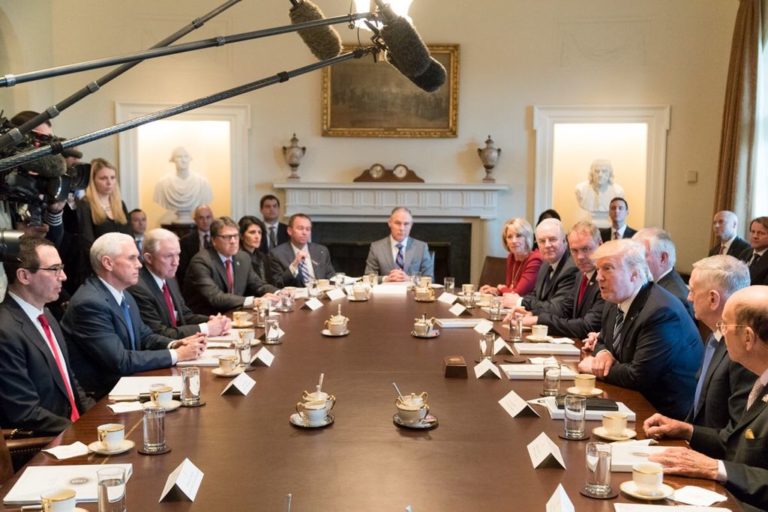Blog
After taking office, Donald Trump increased his cabinet to 15 advisors, but rather than offering a wider-ranging sounding board, his top people have been diminished by high turnover, factionalism, and scandal. Trump has demanded loyalty, and those who stray often find themselves back in the private sector.
Slightly more than two years after he took office, Trump has lost more than half of his cabinet with only seven remaining from the start of his presidency. Several of the eight roles that have turned over have seen multiple secretaries.
When compared to past presidents, the high turnover is historic for this short a time frame. Andrew Jackson purged his cabinet in 1831, following the Eaton affair, slightly more than two years in office. And five of John Tyler’s six cabinet members resigned in protest in September 1841 (five months after he took office) in protest of his policies.
In 1979, Jimmy Carter fired six cabinet members in a single day, as his presidency spiraled toward the end. He had asked for resignations from all 12 to deal with what he saw as disloyalty.
Several of Trump’s advisors have left because they could no longer carry the water, and others have left due to ethical lapses.
Labor Secretary Alex Acosta is the latest to become embroiled in scandal, following a Feb. 21 report from the Miami Herald’s Julie K. Brown that he broke federal law by concealing a plea agreement from 30 underage victims of who were sexually abused by hedge fund manager Jeffrey Epstein while he was U.S. Attorney in Miami.
On April 27, 2017, Acosta had replaced acting Labor secretary Ed Hugler, who had remained in the role longer than expected after Trump’s initial pick, Andy Puzder, withdrew after it came to light that he employed a housekeeper not authorized to work in the U.S. and may have abused his ex-wife.
Earlier this year, Ryan Zinke resigned as Secretary of the Interior and Jim Mattis left the Department of Defense. The former Navy SEAL ZInke left amid investigations into real estate transactions in his home state of Montana. He was told he could quit or be fired.
As the more high-profile departure, Mattis quit because Trump disregarded his advice to keep some American troops in Syria to combat terrorist groups.
Attorney General Jeff Sessions resigned on Nov. 7, 2018 – the day after the midterm elections that swept Democrats into control of the House of Representatives. His recusal from Special Counsel Robert Mueller’s Russia-collusion probe has angered Trump, and Sessions days were numbered.
Trump had fired Rex Tillerson, his first Secretary of State, earlier in 2018 (March 13). A late-2017 GQ article quoted Tillerson calling Trump “a fucking moron.” After firing him, Trump later tweeted that Tillerson was “dumb as a rock” and “lazy as hell.” The U.S Senate confirmed former CIA Director Mike Pompeo as his replacement on April 26, 2018.
Tom Price resigned after seven months as Secretary of Health and Human Services, in September 2017, after reports surfaced that he had spend more than $1 million of the agency’s funds for travel on private jets and military aircraft.
Alex Azar eventually replaced Price on Jan. 29.
Trump fired Obama-era official David Shulkin, Secretary of Veterans Affairs, for another travel scandal on March 28. A department report had criticized him for misusing agency funds for trips by him and his wife.
The Department of Homeland Security has also had two secretaries, after its initial cabinet representative, John Kelly, left on July 28, 2017, to become Trump’s chief of staff.
A few cabinet members have remained in place since the start, including Treasury Secretary Steve Mnuchin; Agriculture Secretary Sonny Perdue; Commerce Secretary Wilbur Ross; Housing and Urban Development Secretary Ben Carson; Transportation Secretary Elaine Chao; Energy Secretary Rick Perry; and Education Secretary Betsy DeVos.

